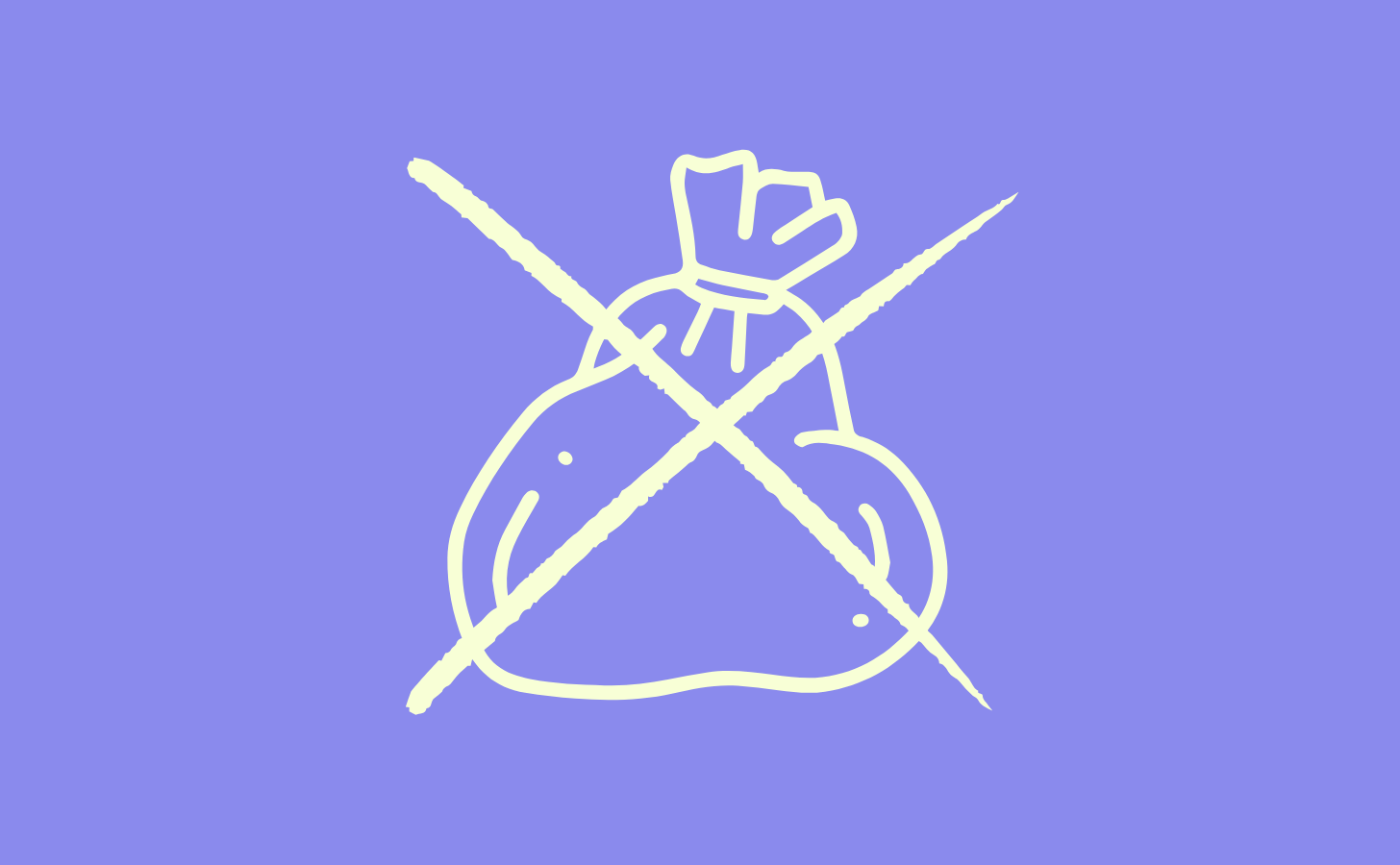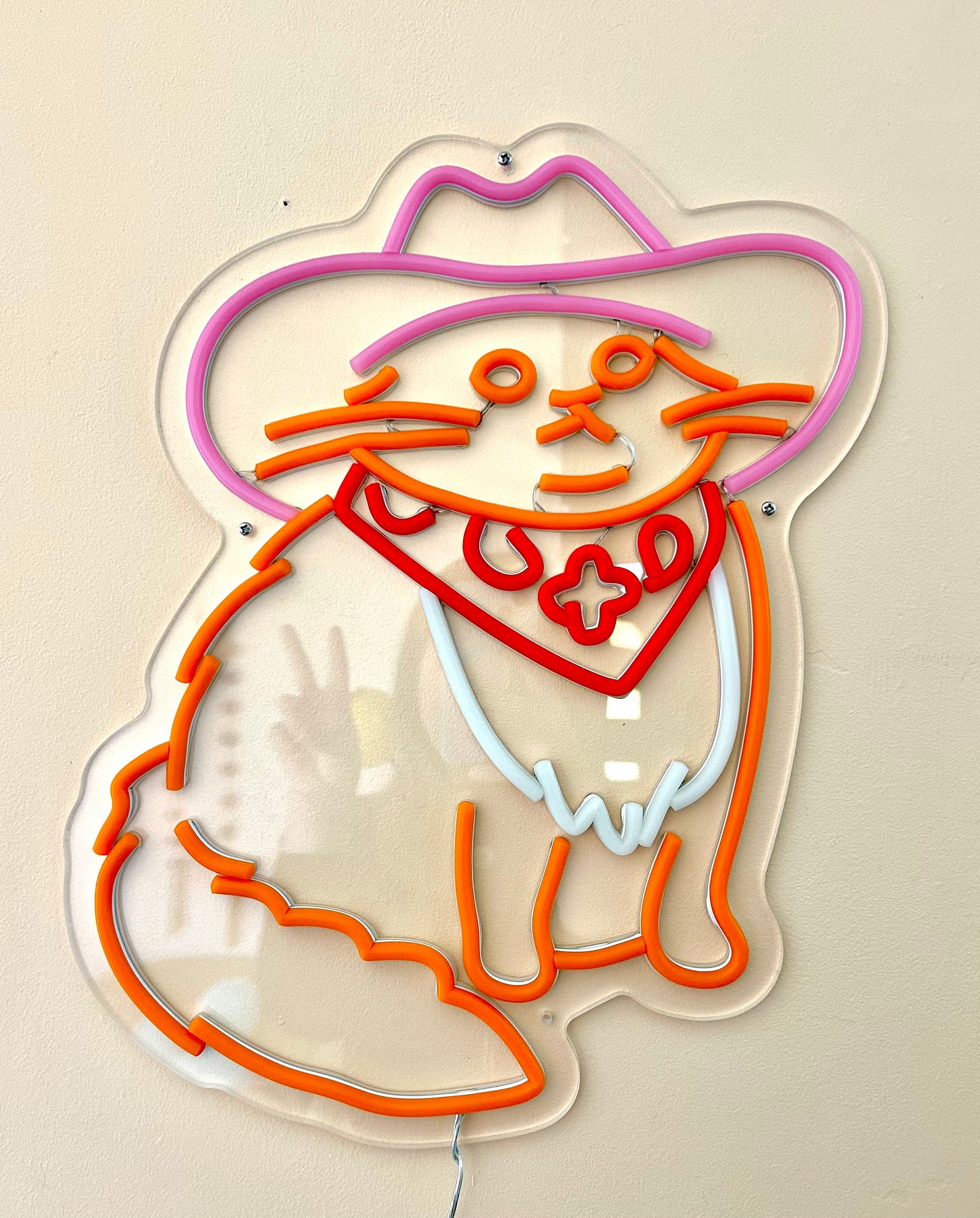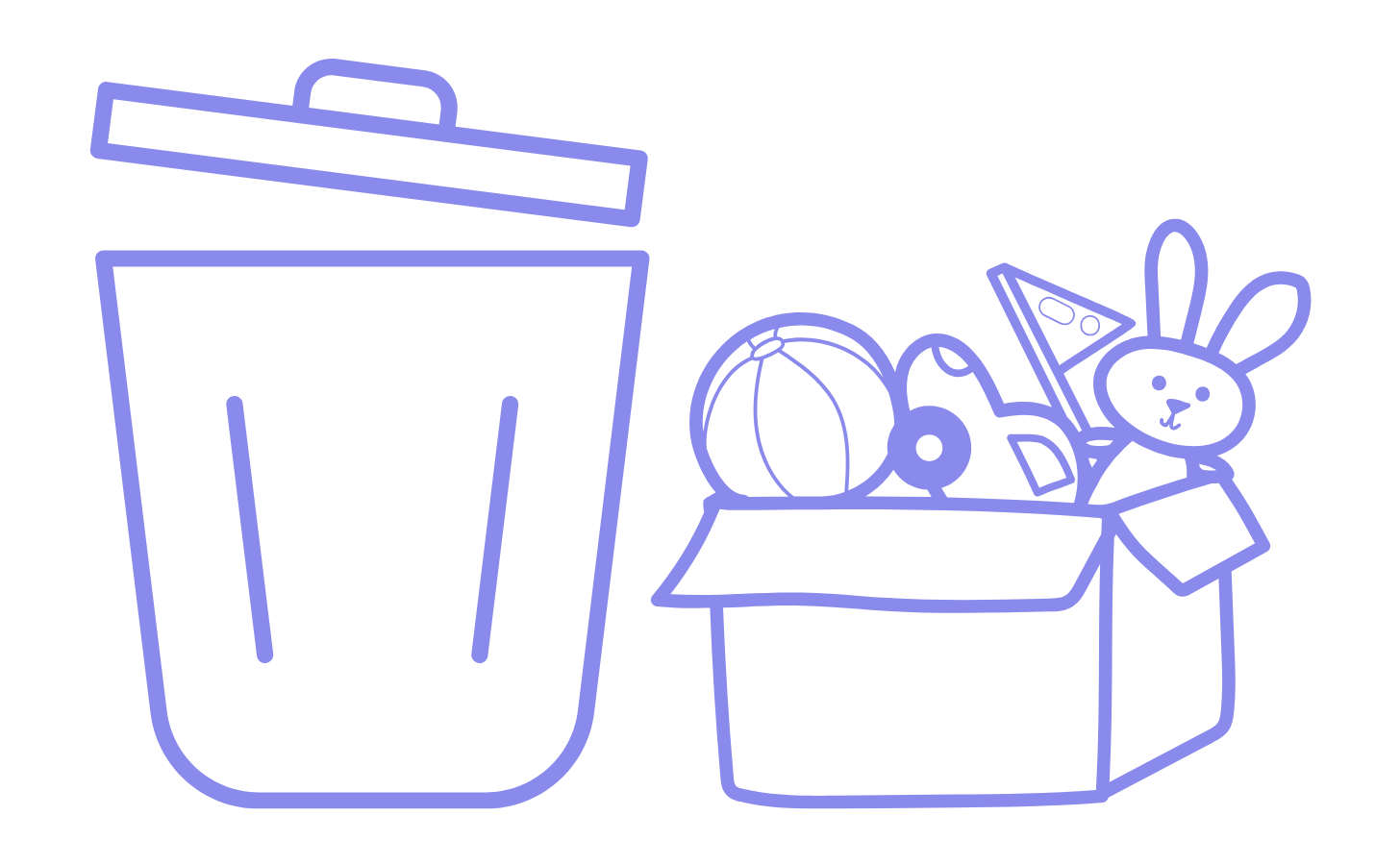No Junk November: Getting creative with the ways in which we consume or give
Almost everything we've ever bought still sits somewhere on Earth. Do we really need more crap?
I’m not much of a minimalist. I’m lucky to have in my home a number of tchotchkes and decorations that reflect my or my partner’s values, interests, or personalities: the Fantastic Mr. Fox art framed above the couch, the LEGO bird of paradise on our dresser, the rug shaped like a stick of butter that sits in front of the kitchen sink. I think it’s important to cultivate an everyday environment that allows you to feel “at home,” and I’d argue the neon sign of a cat wearing a cowboy hat that hangs on my office wall is, uh, vital to my mental well-being or whatever.
But I’m also tired of accumulating crap.
Most of my Pinterest feed these days consists of ads for stuff—tablecloths and crop tops and waffle makers and craft supplies—despite me only ever using the app to look at dinner recipes and tattoo inspiration. Every time I scroll Instagram, I’m inundated with Reels about purchasing the mini Lowes bucket to serve cocktails in, matching your Stanley with your workout attire, or signing up for subscription boxes that send new toys to your dog on a monthly basis. And now that we’ve hit holiday season, consumerism is at its peak. Target insists that I need new Thanksgiving centerpieces and Christmas ornaments (20% off today only!) because last year’s aren’t sufficient for some reason. Costco screams gift ideas into my phone. A friend tells me she hit the jackpot at Five Below. Even the (allegedly) sustainable brands I like are gearing up for Black Friday sales.
I won’t argue that a Ninja blender might improve someone’s life by helping them eat more nutritionally-balanced breakfasts or that anyone should feel guilty for indulging in a (hopefully local!) buy-one-get-one-50%-off books sale. But many times, the things we buy will not make us happier. In fact, sometimes the burst of excitement we feel when we buy stuff is from the act of buying the thing, not from owning the thing itself—once we get home with our Squishmallow or strappy sandals, we feel exactly the same as we did before that trip to the store.
And then we’re stuck with the thing we’ve purchased (or the person we bought it for is). Buying something for a helluva deal doesn’t make it any less of a burden on our closet or on the planet. It’s still a hunk of plastic or metal or fabric that we’ll probably get sick of owning and donate to Goodwill someday, or worse (sorta), throw away.
This “buy stuff, toss it, buy more stuff” cycle has bothered me for a while, but it came to a head when I read this phrase on social media last week: Nearly everything you’ve ever bought still exists. Whether it exists in your home or on a friend’s coffee table or in a landfill varies depending on the item and its journey, but unless it’s a paper coffee filter or a cardboard moving box, it probably sits somewhere.
Now multiply all of the stuff you’re imagining by the number of adults on this planet that have the privilege of any sort of purchasing power. Yikes.
I was venting about this to my partner recently, insisting that we needed to think more carefully about the things we accumulated, and he had an excellent idea: “Why don’t we make up our own No Junk November?”
No Junk November, according to a few graphics on Facebook, is technically already a thing. But it’s about avoiding convenience (AKA “junk”) foods, and I don’t give one lick about that. So I’m co-opting the name. In my little world, No Junk November is now about taking one month to reconsider and get creative with the ways in which we consume or gift goods.
The point of No Junk November is threefold. To start, it offers the planet a tiny break from the rampant and often thoughtless consumerism that contributes to PFAS and microplastic buildup, chokes landfills, and makes me want to clean out my garage on an exasperatingly frequent basis. Second, it challenges us to think differently about the things we buy—namely, what we buy, why we buy it, and what we do with it once we no longer need it. The idea is that by considering each and every item acquisition with extra care, we train ourselves to consume goods more thoughtfully in the future. Third, it helps us get creative with the gifts we give others during the upcoming holiday season. (More than a third of people who celebrate winter gift-giving holidays begin purchasing presents in November.)
Want to join me? Here are the questions I’ll be asking myself this month and beyond:
Is this item necessary? (Do I really need Christmas-themed cupcake wrappers for the treats I’m bringing to this party? Probably not—the guests will enjoy my cupcakes whether or not they have little ornaments on them.)
Is this item useful? (The donut-shaped vases my friend sends me photos of during her trip to Home Goods, while a touching reminder that she thinks of me when we’re apart, do not actually serve a purpose and will literally collect dust on a shelf if I ask her to pick them up for me.)
Will this item materially improve my life? (New pair of gym shoes when my current ones are covered in holes? Probably. Fall-themed throw pillow? No.)
Will I get long-term use out of this item? (This Spongebob air freshener will lose its scent in three days and promptly end up in the trash.)
Do I like this item’s marketing/packaging more than the item itself? (A perfume might come in a beautiful bottle, but it is not functionally different from most other perfumes.)
Is there a more environmentally-friendly way to consume this item? (Bread wrapped in wax paper instead of plastic bags; tote bags made to order rather than in bulk; buying an item locally instead of having it shipped.)
If I’m buying this item as a gift, is there something more practical or experiential I can give that would bring them just as much joy? (An indoor skydiving gift certificate instead of a toy; a massage Groupon instead of a novelty T-shirt.)
Would the money I’d spend on this item be more useful someplace else? (The answer to this one is pretty much always yes—like most people, I have financial goals that almost always benefit from me saving the $20 I’m otherwise prepared to spend on a scented candle.)
It is a privilege to accumulate. When indulged in too heavily, though, that privilege becomes a burden on the planet and on ourselves. It’s time for me to think more carefully about the things I purchase or collect in the future. Will you join me?
What’s been inspiring me lately:
✰ Mars in Retrograde by James Worth. This serial novel, also available as a PDF for just $10 on Worth’s website, features the most lovable characters within a simultaneously dark and heartfelt tale. I’ve been thinking about this story since I finished it a week or so ago, and I feel that I’m a better writer for having read it.
✰ How I Won a Nobel Prize by Julius Taranto. This book wasn’t what I thought it would be when I borrowed it from the library, and at first, its departure from the serious literary commentary I expected annoyed me a bit. But the novel’s sense of humor quickly won me over, and I still found it an interesting piece of cultural criticism while maintaining a good deal of suspense.
✰ Pearce Oysters by Joselyn Takacs. A beautiful piece of eco-fiction with characters so realistic, I feel as though I’ve actually met them.
✰ The Best Short Stories 2024. The title of this anthology doesn’t lie—these are legitimately some of the best short stories I’ve read in a long time, and I’m not a huge short story gal. (Though I’m trying to be!) Emma Binder’s “Roy,” Brad Felver’s “Orphans,” Madeline ffitch’s “Seeing Through Maps,” and Juliana Leite’s “My Good Friend” were my favorites, and I’m largely linking them here so that I can revisit them again and again.







I swear you are in my brain reading my mind. I’ve been feeling the same way recently. I have so much stuff that I’ve collected and hoarded and it’s so overwhelming. I’m definitely participating in this!
I was just talking to a friend the other day about the anxious dread that consumerism has been filling us both with so the timing on this post was wild!! Love the concept of No Junk November, will for sure be participating. (And thank you for the shoutout as well !!)